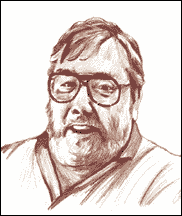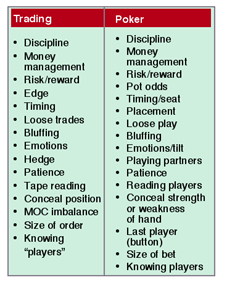Since You Asked
| Confused about some aspect of trading? Professional trader Don Bright of Bright Trading (www.stocktrading.com), an equity trading corporation, answers a few of your questions. | 
Don Bright of Bright Trading |
DAYTRADING: MARK-TO-MARKET OR RETAIL PRICING?
Why do daytrading firms mark-to-market? Why not account for positions the retail way? I heard that retail firms like Ameritrade and Scotttrade take the other side of a retail trader's trades and sell order flow.
If the firm is taking the other side of customer's trades, aren't they losing as well? If so many different orders are coming in each second, how do they manage to sell order flow? How can a retail firm do unlimited shares for $9.99? What about ECN costs? - Still learning
Glad to see that you are taking your trading seriously enough to keep on learning. Professional trading firms use the mark-to-market method of pricing and earnings calculations for a couple of reasons. First, since we trade so many times each day/week/month/year, it would be onerous to match up each trade and keep track accordingly. Second, since stock prices change constantly, mark-to-market gives a better view of the actual profits or losses. If you buy 1,000 of XYZ at $40, and it is trading at $20, the trader has a better view of what we call our net liquidating balance (the true value of the trading account).
Many retail brokers trade against their customers or sell the order flow to another group, often a floor-trading broker-dealer. If you review your contracts with your brokerage, you will see this practice disclosed (but not necessarily explained). Since brokerage firms receive orders on both buys and sells (usually market orders), they can sell to the buyers on the offering price and buy from the sellers on the bid price. This creates profits for the broker and is one reason that we rarely, if ever, use market orders.
The average share size for a retail trader is somewhere around 100 shares per trade, primarily due to margin restrictions and account size. At that rate, they charge 10 to 20 times more than a professional trading firm. With all this extra revenue, they can certainly accommodate the rare large order from someone with a big account balance. They also make money on these same account balances via money flows and interest rates. Many firms don't even care about the actual trading, since they make so much by simply using their customers' money.
TRADE WITH THE SPECIALIST
A while back I read something in your column about "away from market bids and offers" or "enveloping markets" that said we could almost rely on trading with the specialist, rather than against them. I've been unable to find this information, and I would sure like to trade with the specialists. -nysetrader999
I think you are referring to what I call "outside enveloping." I show our new traders how to take advantage of price improvements when the specialist puts up a block print at a favorable price (away from the current market).
If the market is 30.20 bid/30.24 offer, I would have a 30.17 bid/30.27
offer. My market is outside the primary
(specialist) market or NBBO. If there is going to be a block print
put up at, say, 30.05, we see the NYSE market read 30.00 bid with the same
offer, to allow for the 30.05 trade to take place within the current (immediate)
quotation. I would leave my 30.17 bid in place, knowing that if the block
trade takes place at a price lower than mine, I will be filled at that
better price. I also know that most of the time I will be sharing in that
order with the specialist. You see, the specialist can accommodate and
participate in providing shares, but cannot participate in the selling
of shares in this case.
This can be difficult, because you must learn to constantly move your bids and offers away from the NBBO if the price creeps toward it. We only leave our bid or offer in when the NBBO reflects a lower or higher price.
TRADING AND POKER
I spoke to you at an expo in Anaheim this year. I played in the (no-money entry) hold-'em poker game there as well. You had a list of the similarities between stock trading and poker playing; would you mind sharing that list? -Casey
I hope you enjoyed the trading show and the poker game! I have interviewed several player/traders, and will be putting an article together regarding this topic; look for it soon here in S&C. In the meantime, here is the requested list of the similarities:

E-mail your questions for Bright to Editor@Traders.com, with the subject line direct to "Don Bright Question."
Originally published in the October 2005 issue of Technical Analysis of STOCKS & COMMODITIES magazine. All rights reserved. © Copyright 2005, Technical Analysis, Inc.
Return to October 2005 Contents